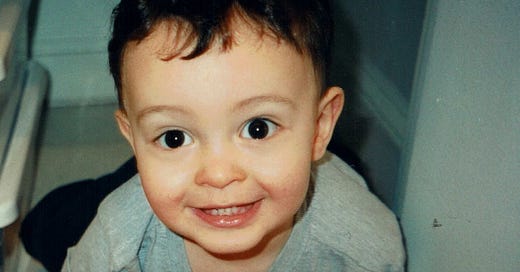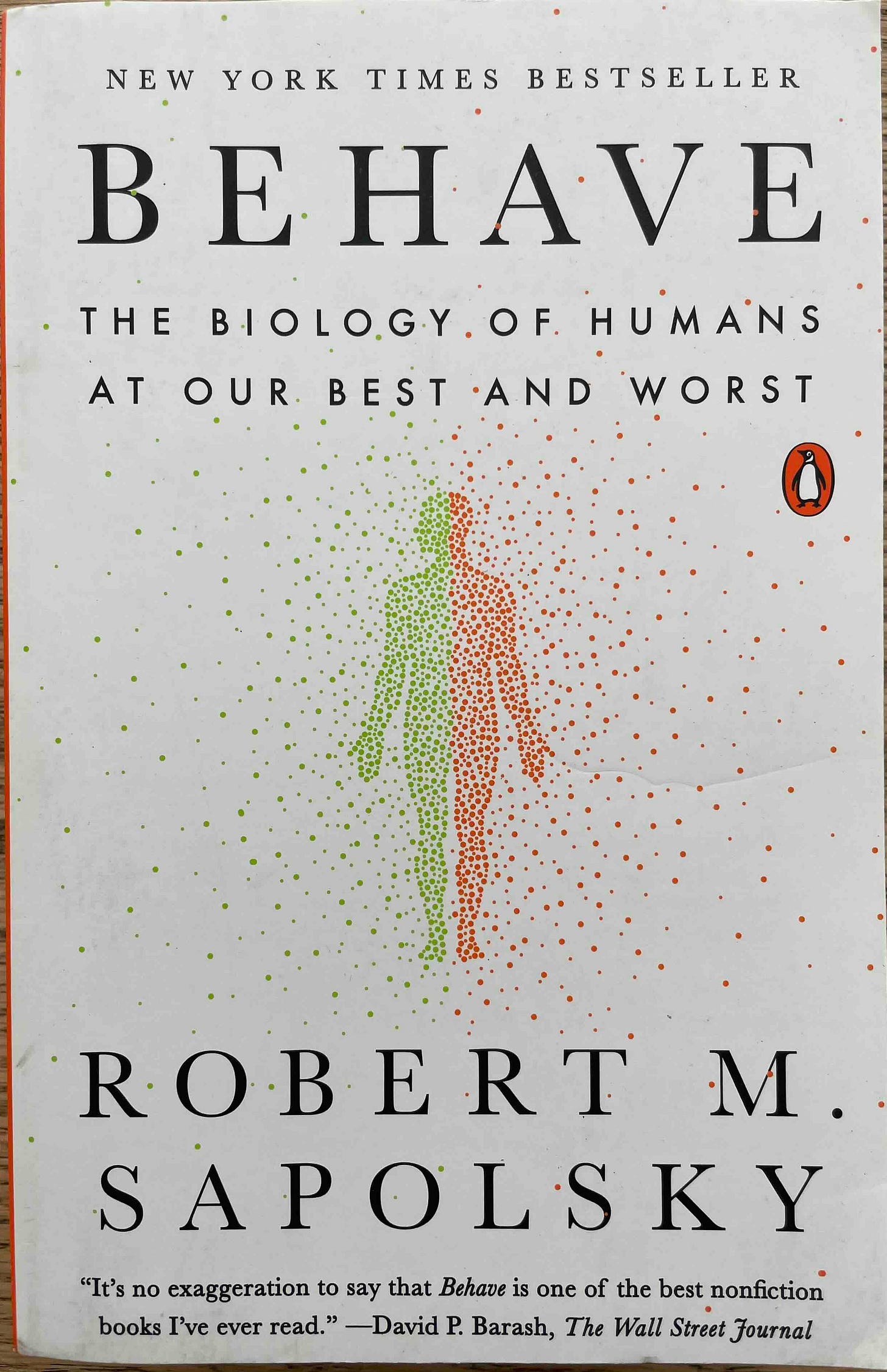Raising a Toddler With a Growth Mindset
Set your kid up to thrive in the coming A.I. apocalypse!
Welcome back to Geoff Rodkey’s Bad Advice! If you’re a neurotic, professional-managerial class parent like me, today’s question might really strike a chord. And by “chord,” I mean the cluster of neurons in your amygdala that activates your fight-or-flight response.
Writing from the affluent-but-not-TOO-affluent enclave of Maplewood, New Jersey, a Concerned Parent is wondering about his toddler’s work ethic:
My wife and I have two young daughters. When I'm playing with the older one (who just turned four), I'll sometimes try to nudge her toward learning opportunities. Like the other day, we were playing with alphabet blocks and I attempted to show her how to spell certain words. At first, she refused. Then she got annoyed. She just wanted to play. Then this morning, she was banging on a mini piano in our living room and I asked her, casually, if she wanted to take piano lessons someday. She shot down the idea and went back to her banging.
“Is there an age when kids are more open to this kind of thing? Or should I just drop it, give up on these attempts to shoehorn learning into their activities, and focus on playing with them?”
I’ve been in your shoes, C.P. I understand not just the struggle involved in raising a high-performance four-year-old, but also the stakes.
When our first son was born, I was laser-focused on maxing out his cognitive skills. I hung some fancy mobile with black-and-white geometric shapes over his crib, because I’d read somewhere that it’d stimulate his visual-spatial development. I spoke to him in complete sentences, soothing him to sleep with improvised monologues about David Foster Wallace and the Supreme Court’s ruling in Bush v. Gore.
God help me, I think I even bought a Baby Mozart CD.
And it worked! Kind of. Today, he’s a “growth marketing specialist” for a “full-funnel performance marketing agency.” I have no idea what those words mean when they’re combined together like that, but he pays his own rent and says he has a 401k. So mission accomplished!
In stark contrast, by the time our third son was born, I was too beaten down by his older brothers to make sure he was getting enough tummy time, let alone a full menu of enrichment activities. Eighteen years later, the poor kid can barely complete a sentence.
That’s not really true. I just want to see if he’s reading this column.
My point is: I’ve been there. And I understand the fear that’s motivating you. After two generations of widening income inequality, it often feels like today’s economy is a banana republic in which the top twenty percent of the work force is skimming off all the surplus while the other eighty percent of us are either treading water or drowning.
And people like you and me are terrified that our children will grow up and drown economically if we don’t mold them into butt-kicking SuperKids by making them jump through endless personal-achievement hoops as soon as they’re old enough to digest solid food.
Now, I could console you with the findings cited in Robert Sapolsky’s Behave, a very large book about human behavioral development that I somehow managed to read before social media degraded my attention span to the level of a moderately clever moth.
Buried somewhere in Behave’s 800 pages is the finding that the absolutely most important thing for a kid’s development is to make sure they don’t experience major trauma in early childhood.
C.P., I’m guessing your daughters are being raised in an environment where they feel safe and loved. In which case, an expert like Sapolsky would tell you they’re going to be just fine, and you should relax and focus on savoring the precious time you have with them before they hit puberty and turn on you like feral cats.
As a parent, you’ve got nothing to worry about.
Except for the A.I. apocalypse.
Unfortunately for us and him, Sapolsky’s book came out prior to the rise of mass public awareness that artificial intelligence-based technologies are about to cut a swathe of devastation across every white collar occupation on the planet.
Long before your daughter enters the workforce, whatever clever-person-who-manipulates-words-or-numbers-on-a-laptop career you thought you were preparing her for will cease to exist.
Pretty soon, jobs like “growth marketing specialist” will be performed by a handful of microchips on a server farm. Writers like me are already obsolete: ChatGPT’s infinitely better at dispensing bad advice than I am, and the only reason OpenAI hasn’t started a Substack is that there’s no money in this.
The only way to dodge the bullet is to do a hard pivot, away from prepping your daughter for professional-managerial work and into the one occupational category that A.I. can’t replace: the building trades.
These are already some of the best jobs in America. I recently bought a house that’s falling apart, and over the past year, I’ve written checks to a small army of electricians, plumbers, and HVAC specialists. To a person, they are highly skilled, well-compensated, and cheerfully unstressed enough to take twenty minutes out of their day to tell me amusing stories about idiots like myself who don’t know how to replace their own fuse boxes.
At some point in every encounter with one of them, they’ll utter the words, “Nobody wants to work anymore,” usually with a shrug and a tone of mild regret. Then they’ll pull out their phone and show me photos of their vacation homes in Mexico, Maine, or the Carolinas.
Sooner or later, I suspect the “nobody wants to work anymore” mantra will go away, because these are going to be the last good jobs in America, and once liberal arts graduates wake up to that fact, the competition’s going to be savage. So if you want to set your kid up for success,
Give your daughter a head start in the trades.
If you’re like me, you’re probably hamstrung by the fact that you have no practical knowledge in any of these fields. But the good news is that the critical infrastructure your kid will grow up to install and/or repair is all around you, and ripe for exploration.
How’s your house heated? Is it a forced-air system? If so, take her to the basement and show her the furnace. After you’ve tried and failed to explain to her how it works, hoist her up into the ductwork and let her crawl around.
Make a game out of it! Tell her the only exit is through a floor grate in her second-story bedroom, then lock her in. To add to the challenge, turn up the thermostat by ten degrees right after she enters.
Is she curious about electricity? Are you? Personally, I’ve always been mystified by it. But kids often have a natural feel for technology that their parents lack. And if you’re indoors right now, I bet there’s an electrical outlet within ten feet of your kid.
Go get a screwdriver and remove the cover plate from the outlet. Stare at the exposed wiring with a look of befuddlement until your daughter wanders over and asks what you’re up to. When she does, tell her you’re trying to figure out where electricity comes from, and you need her help to get to the bottom of this mystery.
Then hand her the screwdriver and see what happens.
Assuming you both survive, you’re going to learn so much! I’m really excited for you. Good luck, and thanks for your interest in my bad advice! Please share this column with any friends or loved ones who might find it unhelpful, and keep the questions coming. I can’t do this without them.





Uh I don’t your solution is very safe but I like the reasoning behind it🙂↕️
The most important line here: “the only reason OpenAI hasn’t started a Substack is that there’s no money in this.” Writers don’t have to worry much about AI - we do the fast-food grunt work everyone else is smart to dodge.